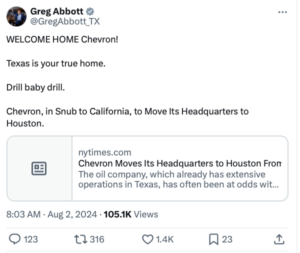What happened: On Thursday, Gov. Greg Abbott swore in the newly appointed Texas Business Court judges at a ceremony in Fort Worth. The court came online September 1, and the first cases have already been filed in the Houston and Austin divisions.

Photo courtesy of the Governor’s Office
Tell me more: The Texas Business Court specializes in complex, business-to-business cases. The court is headed up by judges with specific backgrounds in this type of litigation, helping streamline the resolution of business-related legal challenges, which can often be lengthy and costly.
- By creating an efficient process to handle these disputes and building out this area of Texas’ corporate law, the Lone Star State is creating a strong infrastructure for employers doing business in Texas.
Who are the judges?
- Marialyn Barnard and Stacy Sharp to the Fourth Business Court Division in San Antonio
- Jerry Bullard and Brian Stagner to the Eighth Business Court Division in Fort Worth
- Sofia Adrogué and Grant Dorfman to the Eleventh Business Court Division in Houston
In his own words: “These experienced individuals will serve to ensure that Texas businesses will have a sophisticated and efficient process to resolve their disputes. I look forward to seeing the positive impact these courts will provide for a bigger, better Texas for generations to come.” —Gov. Greg Abbott

Photo courtesy of the Governor’s Office
TLR Thoughts: The Texas Business Court builds on our state’s longstanding investment in economic growth and competitiveness, and these strong appointments are critical to helping establish the court. By creating a specialized forum for resolving commercial disputes, the business court will reduce the burden of complex litigation on Texas job creators and ensure they have access to a fair and efficient legal process.
Read the full press release here.

